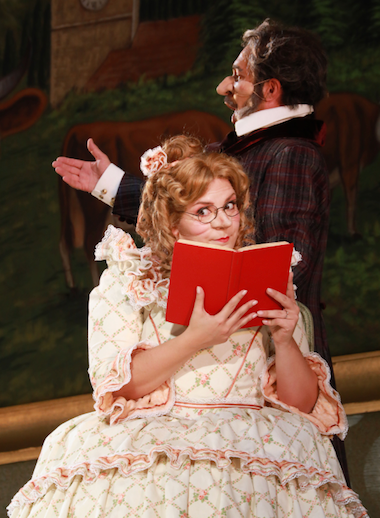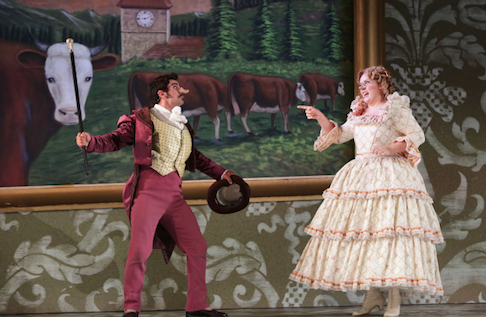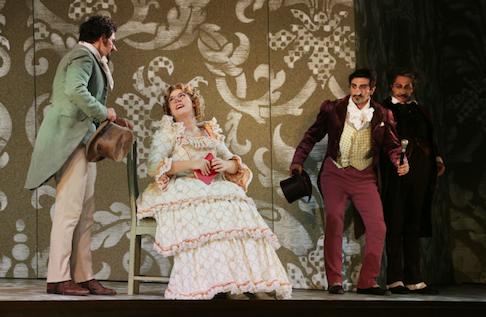Recently in Reviews
English Touring Opera are delighted to announce a season of lyric monodramas to tour nationally from October to December. The season features music for solo singer and piano by Argento, Britten, Tippett and Shostakovich with a bold and inventive approach to making opera during social distancing.
This tenth of ten Live from London concerts was in fact a recorded live performance from California. It was no less enjoyable for that, and it was also uplifting to learn that this wasn’t in fact the ‘last’ LfL event that we will be able to enjoy, courtesy of VOCES8 and their fellow vocal ensembles (more below …).
Ever since Wigmore Hall announced their superb series of autumn concerts, all streamed live and available free of charge, I’d been looking forward to this song recital by Ian Bostridge and Imogen Cooper.
The Sixteen continues its exploration of Henry Purcell’s Welcome Songs for Charles II. As with Robert King’s pioneering Purcell series begun over thirty years ago for Hyperion, Harry Christophers is recording two Welcome Songs per disc.
Although Stile Antico’s programme article for their Live from London recital introduced their selection from the many treasures of the English Renaissance in the context of the theological debates and upheavals of the Tudor and Elizabethan years, their performance was more evocative of private chamber music than of public liturgy.
In February this year, Albanian soprano Ermonela Jaho made a highly lauded debut recital at Wigmore Hall - a concert which both celebrated Opera Rara’s 50th anniversary and honoured the career of the Italian soprano Rosina Storchio (1872-1945), the star of verismo who created the title roles in Leoncavallo’s La bohème and Zazà, Mascagni’s Lodoletta and Puccini’s Madama Butterfly.
Evidently, face masks don’t stifle appreciative “Bravo!”s. And, reducing audience numbers doesn’t lower the volume of such acclamations. For, the audience at Wigmore Hall gave soprano Elizabeth Llewellyn and pianist Simon Lepper a greatly deserved warm reception and hearty response following this lunchtime recital of late-Romantic song.
Collapsology. Or, perhaps we should use the French word ‘Collapsologie’ because this is a transdisciplinary idea pretty much advocated by a series of French theorists - and apparently, mostly French theorists. It in essence focuses on the imminent collapse of modern society and all its layers - a series of escalating crises on a global scale: environmental, economic, geopolitical, governmental; the list is extensive.
For this week’s Live from London vocal recital we moved from the home of VOCES8, St Anne and St Agnes in the City of London, to Kings Place, where The Sixteen - who have been associate artists at the venue for some time - presented a programme of music and words bound together by the theme of ‘reflection’.
'Such is your divine Disposation that both you excellently understand, and royally entertaine the Exercise of Musicke.’
Amongst an avalanche of new Mahler recordings appearing at the moment (Das Lied von der Erde seems to be the most favoured, with three) this 1991 Mahler Second from the 2nd Kassel MahlerFest is one of the more interesting releases.
‘And there was war in heaven: Michael and his angels fought against the dragon; and the dragon fought and his angels, And prevailed not; neither was their place found any more in heaven … that old serpent … Satan, which deceiveth the whole world: he was cast out into the earth, and his angels were cast out with him.’
If there is one myth, it seems believed by some people today, that probably needs shattering it is that post-war recordings or performances of Wagner operas were always of exceptional quality. This 1949 Hamburg Tristan und Isolde is one of those recordings - though quite who is to blame for its many problems takes quite some unearthing.
There was never any doubt that the fifth of the twelve Met Stars Live in Concert broadcasts was going to be a palpably intense and vivid event, as well as a musically stunning and theatrically enervating experience.
‘Love’ was the theme for this Live from London performance by Apollo5. Given the complexity and diversity of that human emotion, and Apollo5’s reputation for versatility and diverse repertoire, ranging from Renaissance choral music to jazz, from contemporary classical works to popular song, it was no surprise that their programme spanned 500 years and several musical styles.
The Academy of St Martin in the Fields have titled their autumn series of eight concerts - which are taking place at 5pm and 7.30pm on two Saturdays each month at their home venue in Trafalgar Square, and being filmed for streaming the following Thursday - ‘re:connect’.
The London Symphony Orchestra opened their Autumn 2020 season with a homage to Oliver Knussen, who died at the age of 66 in July 2018. The programme traced a national musical lineage through the twentieth century, from Britten to Knussen, on to Mark-Anthony Turnage, and entwining the LSO and Rattle too.
With the Live from London digital vocal festival entering the second half of the series, the festival’s host, VOCES8, returned to their home at St Annes and St Agnes in the City of London to present a sequence of ‘Choral Dances’ - vocal music inspired by dance, embracing diverse genres from the Renaissance madrigal to swing jazz.
Just a few unison string wriggles from the opening of Mozart’s overture to Le nozze di Figaro are enough to make any opera-lover perch on the edge of their seat, in excited anticipation of the drama in music to come, so there could be no other curtain-raiser for this Gala Concert at the Royal Opera House, the latest instalment from ‘their House’ to ‘our houses’.
"Before the ending of the day, creator of all things, we pray that, with your accustomed mercy, you may watch over us."
Reviews

23 Aug 2019
L’equivoco stravagante in Pesaro
L’equivoco stravagante (The Bizarre Misunderstanding), the 18 year-old Gioachino Rossini's first opera buffa, is indeed bizarre. Its heroine Ernestina is obsessed by literature and philosophy and the grandiose language of opera seria.
She loves her fiancé for his looks and her tutor for his learning. A well meaning servant spreads the rumor that she is really a castrato male posing as a female to avoid military service. Its two acts are essentially three or more easily imagined farces.
Rossini began working in opera houses at the tender age of nine, thus he absorbed an already formulated and very rich opera buffa tradition. Just now in Pesaro from the first notes of the overture conductor Carlo Rizzi discovered the unique Rossini beat and fanned hints of the famed Rossini crescendo [like, sort of, Ravel’s Bolero only infinitely faster], and unveiled the melodic inflections that presage the great Rossini. It was the same overture Rossini had used for his first farce, La cambiale di matrimonio (1810) and that he would use again for his opera seria Adelaide di Borgogna (1817).
With the exception of a fine quartet and then a truly delightful quintet in the first act, and Ernestina’s rondo in the second act the musical numbers are generic buffa. Of far greater interest is the libretto, by one Gaetano Gasbarri whose day job was as registrar of the Grand Duchy of Tuscany (the program booklet is very informative). First and foremost Sig. Gasbarri’s libretto is a spoof of exalted literary language, and second and foremost as well it is a compendium of sexual innuendo and double entendre. The censors axed the production after only three performances.
But not before the combination of musical genius and licentious scandal had brought Rossini his first fame.
For the occasion the Rossini Opera Festival added supertitles (that are not always provided), and for the very international audience even duplicated the supertitles in English, a first! Of course the words fly by at a speed that precludes getting your mind around verbal subtlety, but we did pick up enough to be greatly amused. The pleasure and reported displeasure of the audiences for those three 1811 performances in the more intimate spaces of Bologna’s Teatro del Corso can only be imagined. [This grand old theater was destroyed in 1944 by a WWII bomb — Bologna was a fascist stronghold.]
The Rossini Festival invested considerable artistic capital in the production besides conductor Rizzi, namely the French stage director team Moshe Leiser and Patrice Caurier, noted for their precise, conceptual minimalism. The single unit set was a wall making a symmetrically broken line, covered with a repeated, regal pattern upon which there was a grandiose painting of several cows (Ernestina’s father was a nouveau riche farmer). The first act was animated by tasteless, often obscene physical gestures. In the second act the set itself did some tricks that were amusing thus relieving somewhat the visual boredom and enlivening the farcical storytelling.
 Ernestina and Buralicchio
Ernestina and Buralicchio
Of equal point were the costumes, most notably the additions of prosthetic noses added to all the faces, thus making sure that we accepted the personages as bizarre (we did indeed). To great effect was the artificially puffed out chest and thrust back butt (the rooster strut) of Ernestina's rich fiance Buralicchio well matching the three grandly laced tiers and frilly décolletage of Ernestina’s very big white dress. Enestina’s father Gamberotto was in a fat suit extolling the pleasures of his wealth, and Ermanno, her tutor was in the clearer colored, slimmer fitting clothes of the victorious suitor.
Buralicchio comes to believe that Ernestina is a male, though Ermanno has not yet heard the rumor and effects a bedroom tryst with Ernestina. We too began to see male characteristics in Ernestina, and in the duet we began to confuse the tenor voice with the mezzo (contralto) voice. The very informative program booklet tells us that the part of Ernestina was composed for a famous contralto named Maria Marcolini, of reported androgynous voice. In fact the tessitura in which Ernestina sings is often in virile territory — mezzos at that time were the descendants of castrati (and there were still plenty of real castrati around).
 Ermanno, Ernestina, Buralicchio and Gamberotto
Ermanno, Ernestina, Buralicchio and Gamberotto
L’equivoco stravagante
was brilliantly cast. Mezzo soprano Teresa Iervolino could produce those virile tones, and as well move into the higher reaches where she managed effective mezzo-soprano fioratura. Her movements hinted at the clumsiness of a male impersonating a female. Bass baritone Paolo Bordogna was the indefatigable Gamberotto, a splendid basso buffo well known to Pesaro audiences. Though you might have expected the patter from Gamberotto, Rossini instead assigned it to the Buralicchio where it was well integrated into Davide Luciano's strutting. Russian tenor Pavel Kolgatin ably executed the florid lines of the tutor Ermanno.
Not to forget the opera buffa’s two stock trouble makers, the servants Rosalia sung by Claudia Muschio and Frontino sung by Manuel Amati.
Michael Milenski
Production information:
Production information:
The chorus of the Teatro Ventidio Basso (Ascoli Piceno); the Orchestra Sinfonica Nazionale Della RAI (Torino). Conductor: Carlo Rizzi; Stage Directors; Moshe Leiser and Patrice Caurier, Sets: Christian Fenouillat; Costimes: Agostino Cavalca; Lights: Christop;he Forey. Vitrifrigo Arena (formerly the Adriatic Arena), Pesaro, Italy. August 19, 2019.


